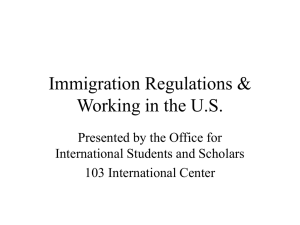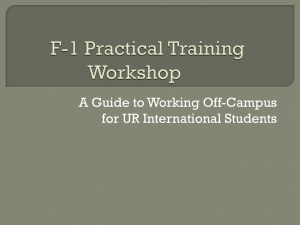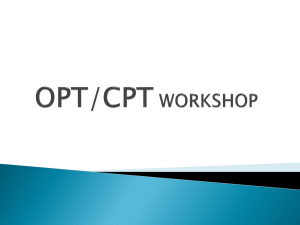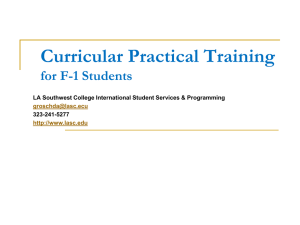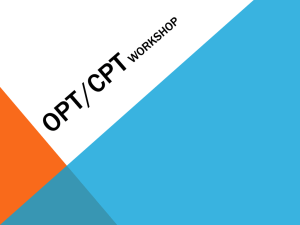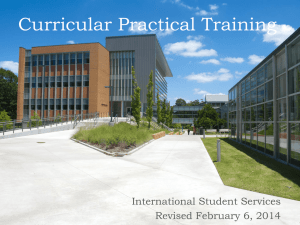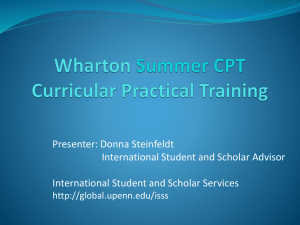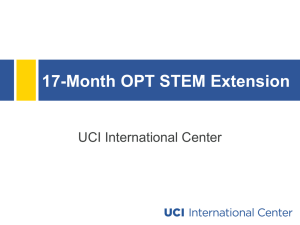F-1 Employment Options - Office of International Students & Scholars
advertisement
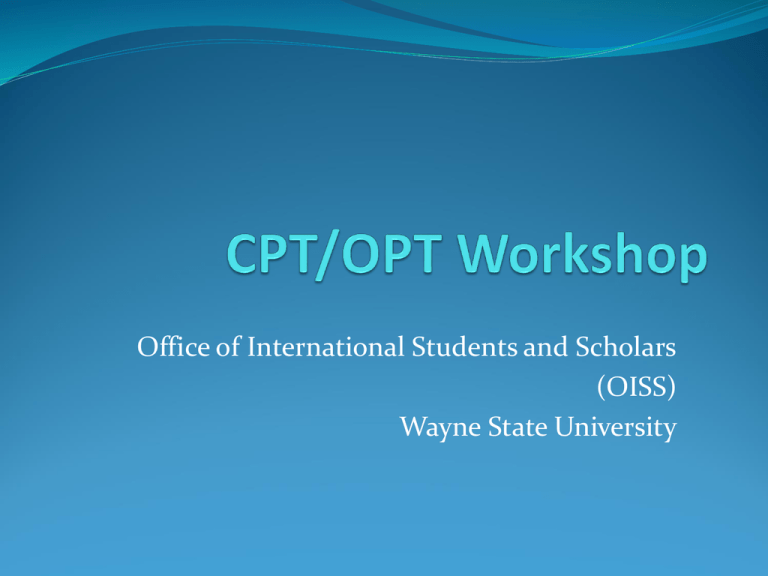
Office of International Students and Scholars (OISS) Wayne State University Presenter Doreen Adams Student & Scholar Advisor Employment Options for F-1 Students On-Campus Student Assistant GRA/GTA/GSA Off-Campus Curricular Practical Training(CPT) Optional Practical Training(OPT) Curricular Practical Training CPT Curricular Practical Training (CPT) is defined as employment which is an integral or important part of a student’s curriculum, internship, cooperative education, or any other type of required internship or practicum. Training must be directly related to student's field of study and commensurate with student’s educational level. Training must be a requirement of the program of study and/or receive course credit. CPT is available to students who have been lawfully enrolled on a full-time basis for at least one academic year (two semesters). CPT is limited to a maximum of 12 months, unless an extended period is required for the program of study. Curricular Practical Training If full-time CPT is for 12 months or more, the student becomes ineligible for optional practical training(OPT). The experience must be supervised by a professor and the student must receive academic credit. CPT approval is specific to a specific position, employer, location, and duration. No USCIS approval is required. Students must have a job offer. Students qualified to take CPT in the last semester must enroll for their final course along with 1 CPT credit hour even in the last semester. CPT is not available after graduation. ☼ Curricular Practical Training Full-time CPT during the semester, must register for at least 1 credit internship coursework that is directly related to CPT Part-Time CPT during the semester, must register for 12 credits for undergraduate students and 8 credits for graduate students including at least one credit internship coursework that is directly related to CPT Students participating in CPT during the annual vacation term are required to be enrolled for at least 1 credit hour internship coursework that is directly related to CPT CPT is approved for one semester at a time and if you intend to continue for the following semesters, you need OISS approval prior to starting of the next semester. ☼ Curricular Practical Training Training program must be listed in the school’s course catalog with the assigned number of credits and; Name of faculty member teaching the course clearly indicated; Internship must be listed in Plan of Work (POW)(Only for Graduate students) There should also be a description of the course with the course objectives clearly indicated Students enrolled in such a course should work out the details of their specific projects within the established course objectives under the supervision of the instructor.” Students must submit their internship report approved by the professor at the end of semester of CPT. ☼ Examples of Curricular Practical Training *Mandatory CPT is limited to a maximum of 12 months, unless an extended period is required for the program of study. Specific training is required of all students. For example, fieldwork for a MSW that is required of all students to work in a social service agency is mandatory CPT; or Education students in which in-class room teaching is required of all students in order to complete the degree program. ☼ Examples of Curricular Practical Training *Integral part of an established program The primary purpose of CPT is to meet Academic requirements through a work experience. CPT for a particular course or curricular track. For example, a MBA student is offered several options to fulfill the concentration in marketing—a paid internship is required for a particular course or track, even though it is not required of all MBA students. ☼ Examples of Curricular Practical Training *Co-Op Students must possess at least a 2.0 grade point average Students must be in junior status (60 semester hours) undergraduate only For both types, the students are required to register for a co-op course. Career Services is responsible for pre-screening and registers the student for a co-op course in Banner, prior to sending the student to OISS for CPT approval The CPT dates based on co-op have to be consistent with the term date Curricular Practical Training Final Approval Approval is recommended by the academic advisor and final approval by an OISS advisor before student can begin working Optional Practical Training OPT General concepts OPT is defined as employment that is directly related to a student’s field and level of study OPT is an employment opportunity available to an F-1 student who has been lawfully enrolled on a full time basis for at least one full academic year. USCIS must adjudicate all OPT applications before they start working. Processing time can be up to 3 months. Maximum of 12 months of OPT OPT is authorized per educational level Must not have used more than 12 months of full-time CPT at that degree level ☼ Continued…. OPT is approved for each educational level and is approved in chronological order of their educational level (Bachelors, Master’s and Ph.D). OPT is not eligible when student moves from higher to lower levels of degree program. Part-time or full-time during the student’s annual vacation and at other official school breaks, if the student intends to register for the next term of the session Part-time while school is in session Part-time or full-time after completion of graduate course requirements excluding a thesis or dissertation Fulltime after completion of the course of study OPT Application Process Students must initiate the OPT process by completing the OPT application from OISS Requesting an I-20 from OISS recommending them for OPT Students must file an I-765 form with supporting documents to USCIS If approved by USCIS, the student will receive an EAD card and cannot start work until the student receives the card 14 Types of OPT Pre-completion: Post-completion: Extension: Cap-Gap Extension STEM Extension Optional Practical Training Pre-completion OPT A student may apply for pre-completion OPT to work in their field of study if the program doesn’t have an internship coursework. A student can only work 20 hours per week while school is in session; and must be enrolled full time. Over 20 hours a week can be requested for pre-completion OPT done during official breaks or spring/summer; After student has completed all coursework required for the degree while the student is completing a thesis or dissertation. Students must continue to enroll full time until the completion of course work. ☼ Optional Practical Training Post Completion OPT Application can be made 90 days prior to the completion of study or must be within 60 days of the completion of the degree program. The training must be directly related to the student’s field of study and commensurate with the student’s educational level. No job offer is required. ☼ Cap-Gap Extension Cap-Gap Extension F-1 students who are beneficiaries of a timely-filed H-1B petition are eligible for either: An extension of their F-1 status and OPT work authorization till 9/30/9999 What is the H-1B cap? The cap is the mandated limit to the number of individuals who may be granted H-1B status during each fiscal year. For FY08, the cap was 65,000 with some exemptions (additional 20,000 for graduate students). What is the F-1/H-1B Cap-Gap? The cap-gap occurs when an F-1 student’s status and work authorization expire in the current fiscal year, before the student can start approved H-1B employment at the beginning of the next fiscal year, October 1. In the past, the student would have to leave the U.S. and return when the H-1B authorization became effective 18 STEM Extension What is the STEM Extension? F-1 students who have completed a bachelor’s, master’s or doctoral degree in a STEM field (science, technology, engineering, or math) may be granted a one-time 17 month extension to OPT This gives U.S. employers two chances to apply for the H-1B process since the extension is long enough to allow for petitions to be filed in two successive fiscal years 19 STEM Extension: Eligibility Must have a bachelor’s, master’s or doctoral degree included in the STEM Designated Degree Program List Must be engaged in post-completion OPT based on a designated STEM degree Must be employed by an employer that is enrolled in the E-Verify Program Must apply before current post-completion OPT expires and the 17 month extension is based on your current degree. 20 STEM Extension: Types of Allowed Employment Students must work at least 20 hours each week for an E-verify employer in a position directly related to the student’s STEM degree STEM students may work multiple jobs, but all employers must be enrolled in E-Verify Students may switch jobs, but the new employer must also be enrolled in E-Verify 21 Frequently asked questions: What is my immigration status while I am on OPT? OPT is a benefit of being an F-1 student. Therefore, while you are on OPT you are still an F-1 student and are still subject to the rules and regulations pertaining to your F-1 status. In the eyes of immigration, your intent is to return home after you complete your studies and OPT. You still must have your I-20 signed for travel. Optional Practical Training OPT recommendation is conducted by an OISS advisor and approval is granted by United States Immigration and Citizenship Service (USCIS) Thing to Remember CPT on Maintenance Status CPT for WSU internship Having CPT/pre-OPT and on-campus position(Student assistant, GRA/GTA) OPT Reporting Volunteering During OPT(Receive the letter from employer for your records) Must be paid employment during STEM extension. OPT Extension and degree certificate 90 days unemployment You must need offer letter/EAD during travel outside of US and re-entering during OPT 24 For More Information... Visit our website at http://www.oiss.wayne. edu Meet with an advisor during AOC hours or make an appointment
